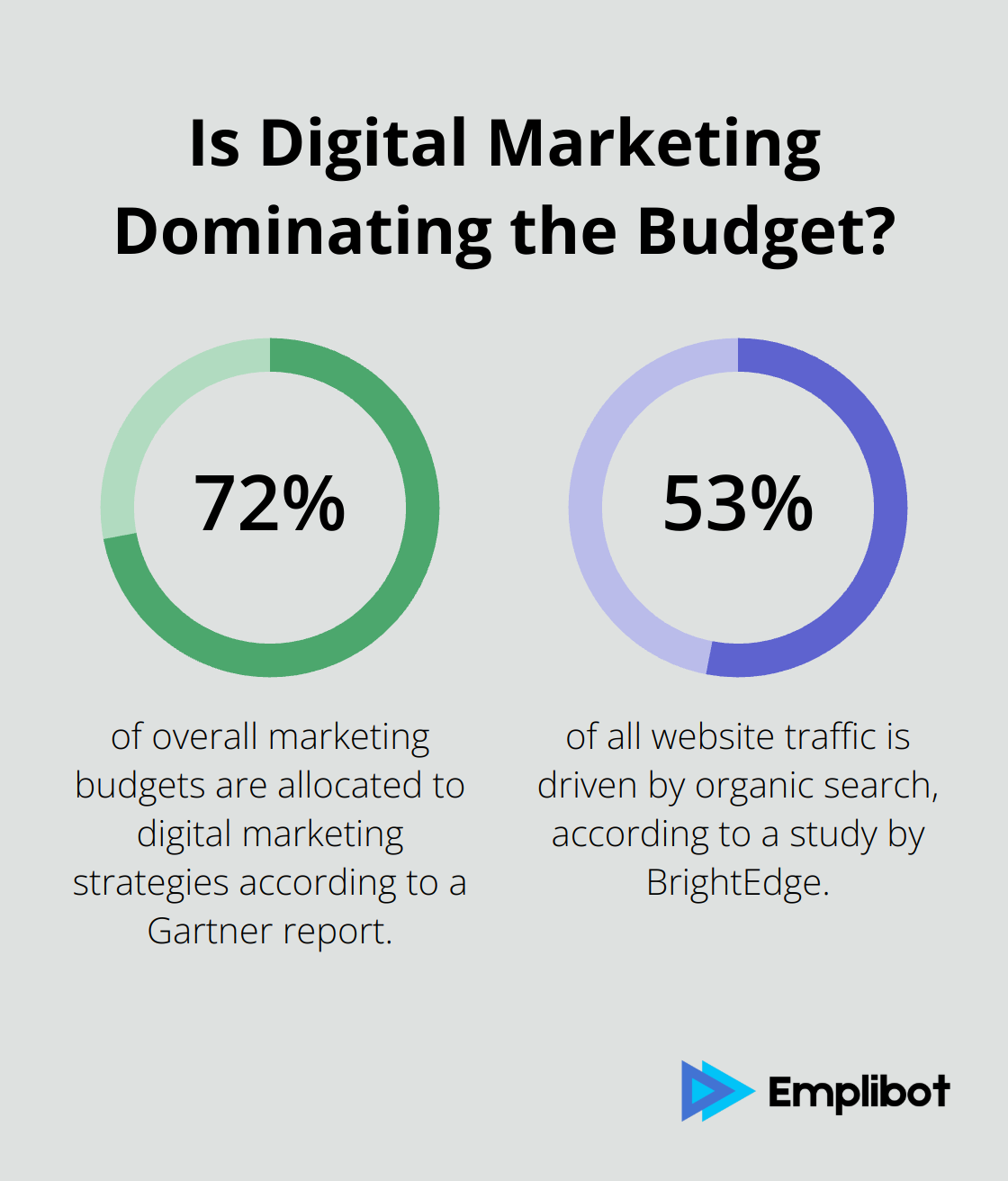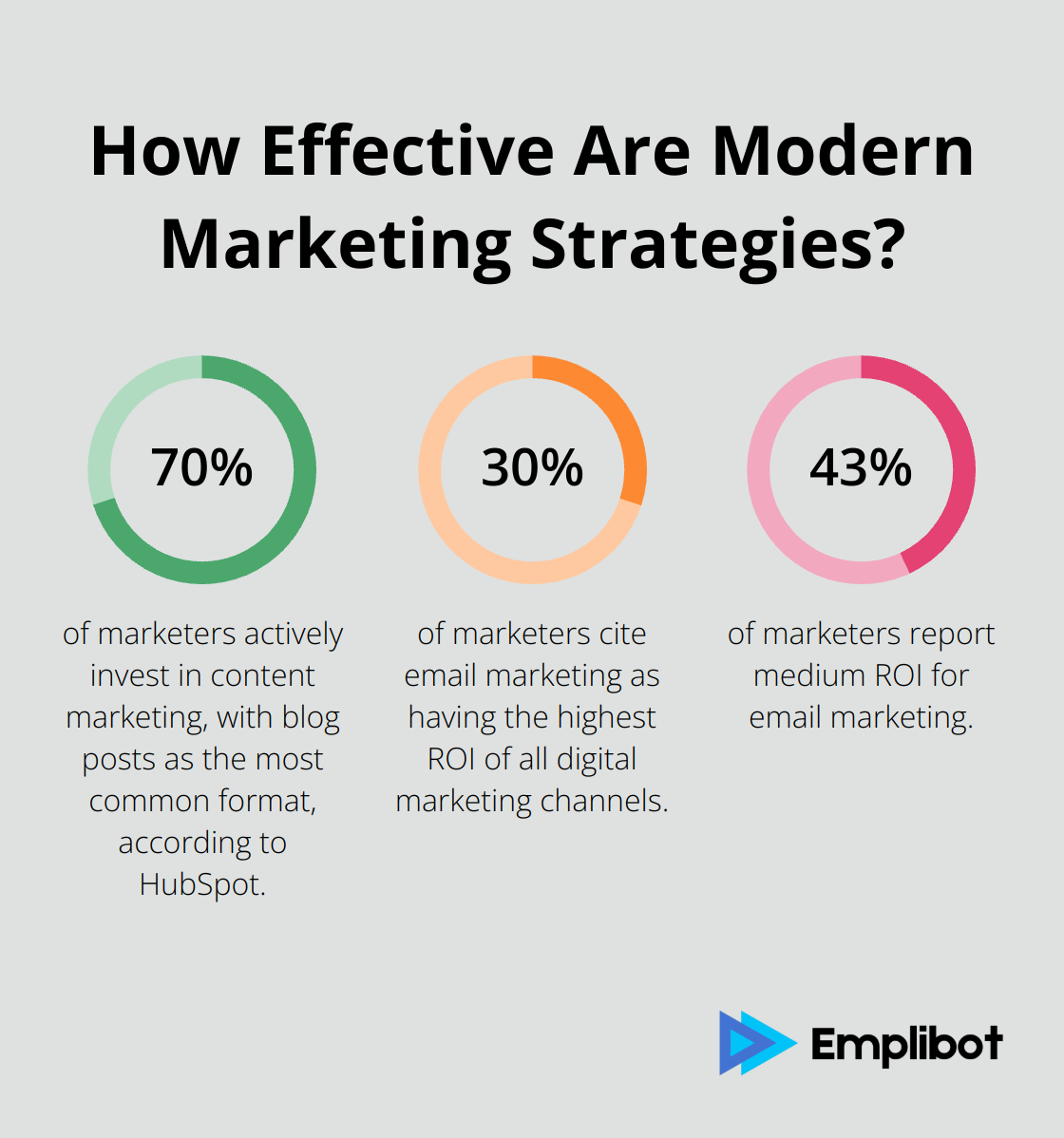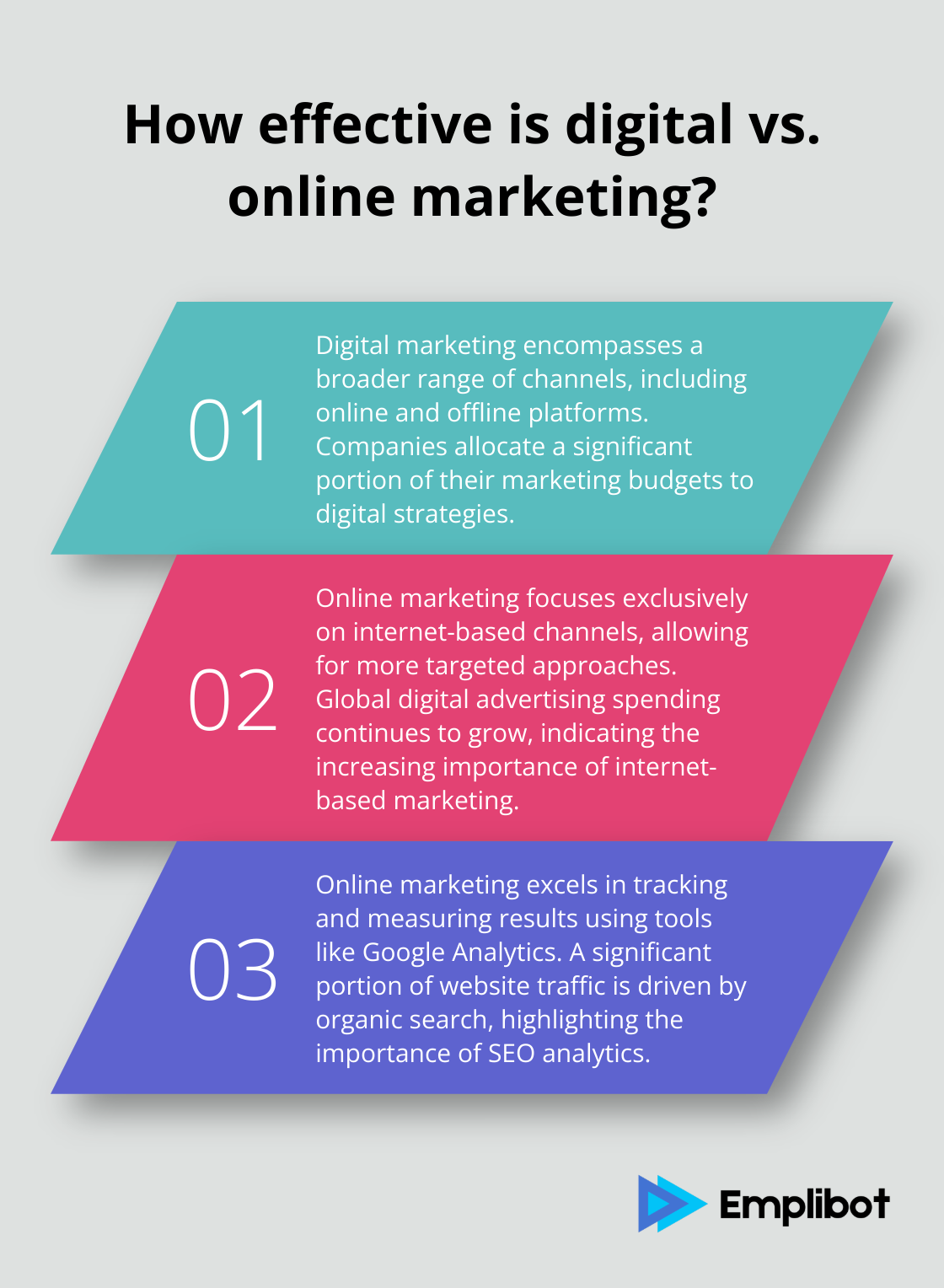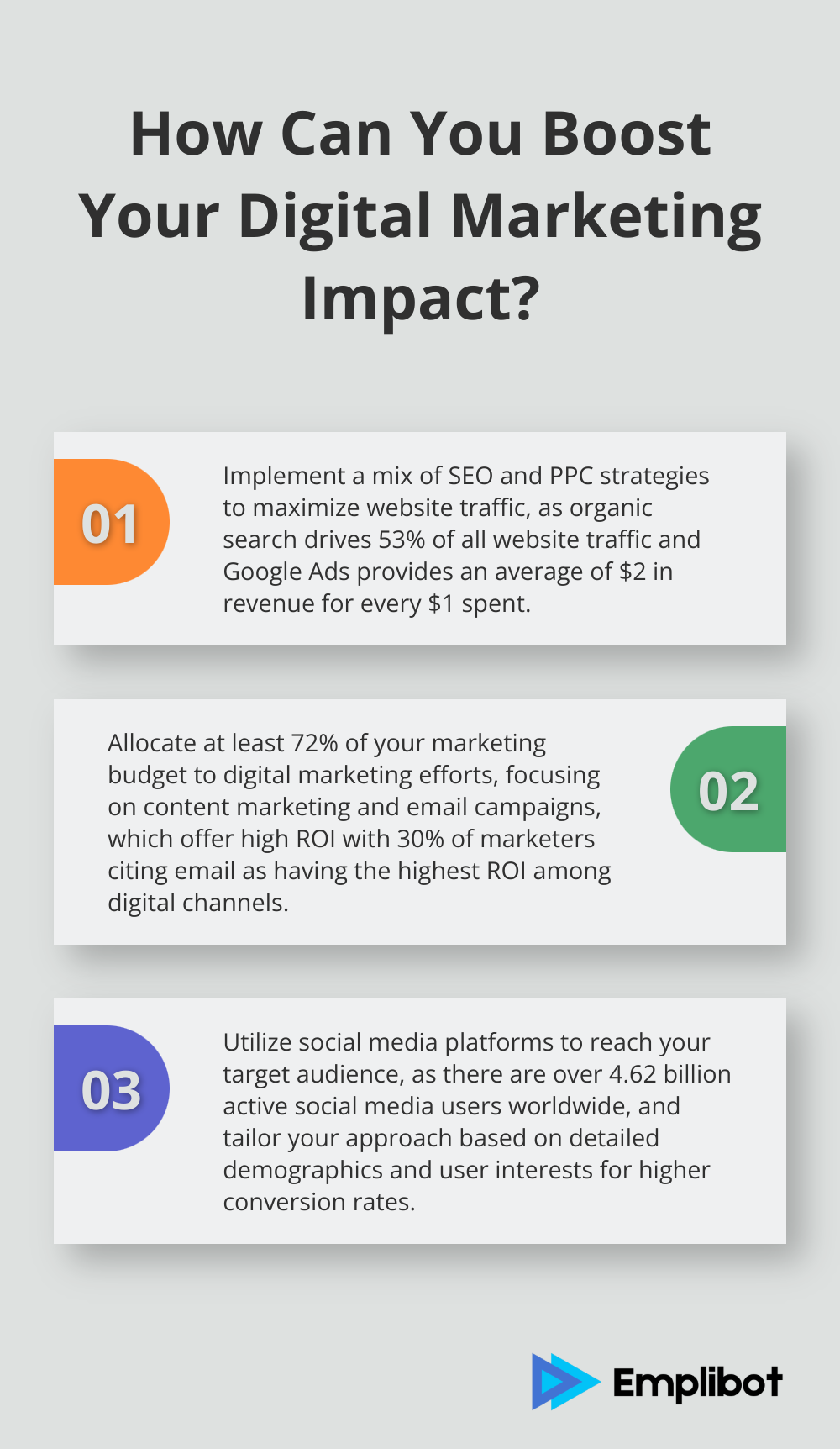At Emplibot, we often encounter confusion about digital marketing vs online marketing. Many businesses struggle to differentiate between these two approaches.
In this post, we’ll clarify the key distinctions between digital and online marketing strategies. We’ll explore their unique characteristics, tools, and applications to help you make informed decisions for your marketing efforts.
Contents
ToggleWhat Is Digital Marketing?
Digital marketing encompasses a broad strategy that uses digital technologies to reach and engage customers. It includes all marketing efforts that utilize electronic devices or the internet. The impact of digital marketing on how businesses connect with their audience is significant.
The Scope of Digital Marketing
Digital marketing extends beyond online channels. It incorporates offline digital technologies such as SMS marketing and digital billboards. A report by Gartner reveals that companies allocate an average of 72% of their overall marketing budgets to digital marketing strategies. This substantial investment underscores the critical role of digital marketing in today’s business landscape.
Key Components of Digital Marketing
Search Engine Optimization (SEO)
SEO optimizes websites to rank higher in search engine results pages. A study by BrightEdge found that organic search drives 53% of all website traffic, making SEO an essential part of any digital marketing strategy.
Content Marketing
Content marketing involves the creation and distribution of valuable, relevant content to attract and retain a clearly defined audience. According to recent statistics, content marketing is among the most effective lead generation strategies.
Pay-Per-Click (PPC) Advertising
PPC is a model where advertisers pay a fee each time their ad receives a click. Google Ads (the most popular PPC platform) allows businesses to make an average of $2 in revenue for every $1 they spend.
Digital Marketing Channels
Social Media Marketing
Social media marketing offers immense potential for reaching target audiences. DataReportal reports over 4.62 billion active social media users worldwide, making platforms like Facebook, Instagram, and LinkedIn powerful marketing tools.
Email Marketing
Email marketing remains one of the most effective digital marketing channels. Campaign Monitor reports that email marketing provides an average return on investment of $44 for every $1 spent.
Mobile Marketing
The importance of mobile marketing continues to grow as smartphone usage increases. According to Statista, mobile devices generated 54.8% of global website traffic in the first quarter of 2021.

As we explore the various facets of digital marketing, it’s important to understand how it differs from online marketing. Let’s examine the specific characteristics and strategies of online marketing in the next section.
What Is Online Marketing
Online marketing, also known as internet marketing, focuses exclusively on strategies and tactics implemented through the internet. This subset of digital marketing harnesses the power of internet-based channels to promote products, services, or brands.
The Core of Online Marketing
Online marketing strictly limits itself to internet-connected platforms, unlike digital marketing which encompasses both online and offline digital strategies. A report by Statista projects global digital advertising spending to reach $870.85 billion by 2027, underscoring the significance of internet-based marketing in today’s business landscape.
Key Online Marketing Strategies
Search Engine Optimization (SEO)
SEO remains a cornerstone of online marketing. A study by BrightEdge found that organic search drives 53% of all website traffic, emphasizing the importance of optimizing online content for search engines.
Content Marketing
Content marketing drives traffic and establishes industry authority. HubSpot reports that 70% of marketers actively invest in content marketing, with blog posts as the most common format.
Pay-Per-Click (PPC) Advertising
PPC advertising proves highly effective in online marketing. Google Ads (the most popular PPC platform) allows businesses to make an average of $2 in revenue for every $1 they spend, demonstrating a direct return on investment.
Online Marketing Channels
Social Media Platforms
Social media offers immense potential for reaching target audiences. DataReportal reports over 4.62 billion active social media users worldwide, making platforms like Facebook, Instagram, and LinkedIn powerful marketing tools.
Email Marketing
Email marketing continues to be one of the most effective online marketing channels. 30% of marketers cite email marketing as having the highest ROI of all digital marketing channels, with another 43% reporting medium ROI, making it a cost-effective strategy for businesses of all sizes.

A comprehensive online marketing strategy often involves a mix of these channels and tactics. The right combination of online marketing strategies allows businesses to effectively reach their target audience, drive traffic, and increase conversions in the digital space. As we move forward, it’s essential to understand how online marketing differs from the broader concept of digital marketing, which we’ll explore in the next section.
How Digital and Online Marketing Differ
Scope and Reach
Digital marketing encompasses a broader range of channels, including both online and offline digital platforms. It incorporates strategies such as social media, websites, email, SEO, and PPC. Companies allocate a significant portion of their overall marketing budgets to digital marketing strategies, which highlights its extensive scope.

Online marketing focuses exclusively on internet-based channels. This narrower focus allows for more targeted approaches but may limit reach to those with internet access. Global digital advertising spending continues to grow, indicating the increasing importance of internet-based marketing.
Tools and Technologies
Digital marketing uses a diverse array of tools, from traditional media buying software for TV and radio ads to advanced digital platforms. Digital billboards, for example, use content management systems that allow for real-time updates and targeting based on time of day or weather conditions.
Online marketing relies on web-based tools and platforms. This includes websites, email, SEO, PPC, and social media marketing activities. These tools help businesses manage and analyze their online marketing campaigns effectively.
Measurement and Analytics
Online marketing excels in tracking and measuring results. Tools like Google Analytics provide detailed insights into website traffic, user behavior, and conversion rates. The importance of SEO analytics in online marketing is evident in the significant portion of website traffic driven by organic search.
Digital marketing, while still measurable, faces challenges in tracking offline interactions. For TV advertisements, Nielsen ratings provide viewership data, but linking these directly to sales proves more complex. Advances in technology bridge this gap. Some companies use unique phone numbers or QR codes in TV ads to track responses more accurately.
Target Audience Considerations
Digital marketing allows for broader audience targeting, including demographics less likely to be online regularly. This becomes particularly relevant when targeting older generations or rural populations with limited internet access.
Online marketing excels in precise audience targeting. Platforms like Facebook Ads allow marketers to target users based on interests, behaviors, and detailed demographics. This level of targeting can lead to higher conversion rates. Personalized approaches in online marketing have shown to be more effective in converting potential customers.
Most successful marketing strategies incorporate elements of both digital and online marketing. The key is to understand your target audience and choose the channels that will most effectively reach and engage them.
Final Thoughts
Digital marketing and online marketing differ significantly in scope and application. Digital marketing encompasses a wider range of channels, including offline digital touchpoints, while online marketing focuses exclusively on internet-based strategies. This distinction proves important for businesses that want to create effective marketing campaigns tailored to their target audience and goals.

The choice between digital marketing and online marketing depends on your specific business needs and target demographics. Digital marketing offers broader reach, making it suitable for diverse audiences, while online marketing excels in precision targeting and real-time analytics. Both approaches have their strengths, and many successful strategies incorporate elements from each.
Emplibot can help you maintain a strong online presence across various platforms. It automates your WordPress blog and social media, handling everything from keyword research to content creation and SEO optimization. Emplibot produces high-quality, engaging content tailored to your business, regardless of whether you focus on digital marketing or online marketing strategies.










 Rated Excellent 4.5
Rated Excellent 4.5